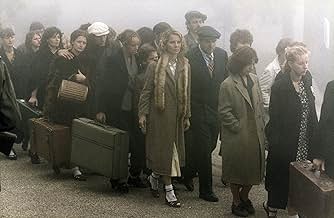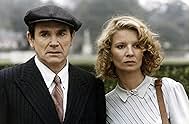VALUTAZIONE IMDb
7,3/10
2939
LA TUA VALUTAZIONE
Attraverso una musica favolosa, ripercorre tre generazioni di musicisti e ballerini provenienti da Russia, Germania, Francia e Stati Uniti, da prima della Seconda Guerra Mondiale, attraverso... Leggi tuttoAttraverso una musica favolosa, ripercorre tre generazioni di musicisti e ballerini provenienti da Russia, Germania, Francia e Stati Uniti, da prima della Seconda Guerra Mondiale, attraverso la guerra e l'Olocausto, fino agli anni Ottanta.Attraverso una musica favolosa, ripercorre tre generazioni di musicisti e ballerini provenienti da Russia, Germania, Francia e Stati Uniti, da prima della Seconda Guerra Mondiale, attraverso la guerra e l'Olocausto, fino agli anni Ottanta.
- Premi
- 1 vittoria e 6 candidature totali
Recensioni in evidenza
10ericibe
I may not remember everything, but this film has been on my mind since I saw it 23 years ago. I was in high school in a small town in Iowa. One of our band directors had a large collection of film on tape and laser disc. He would have movie parties for kids he taught. I showed an interest in film and he would screen some films I would have otherwise never have seen. I remember watching Bolero. (I do not think I knew it was known by any other name) I was in absolute awe of this film. The music, the story, the pacing - everything you couldn't get from popular American films.
I have avoided seeing it again in the intervening time because I did not want my more grown up sensibilities to have a different opinion of the film. After reading some of the comments here I can feel safe to view it again.
I have avoided seeing it again in the intervening time because I did not want my more grown up sensibilities to have a different opinion of the film. After reading some of the comments here I can feel safe to view it again.
Just viewed this movie on a DVD from Netflix. This movie is what a motion picture can be in the hands of an intelligent and talented director.
The photography was wonderful, the use of color was spectacular, the sound was excellent, and the music and performances were top notch. I especially liked the full symphony orchestra segments and the American big band segments. The Folies-type musical numbers were also done with flair, and Geraldine Chaplin proved herself to be a classy cabaret singer (assuming her voice wasn't dubbed). Michel Legrand I believe was responsible for the music, which was first rate throughout.
All production values were of the highest order.
The final dance sequence, which lasted far longer than anything Hollywood would permit, was phenomenal; the late Jorge Donn was not Nureyev, but spectacular all the same. The robustness and uncompromisingly balletic style of the finale put the ballet sequences in a couple of American movies--American In Paris and Carousel-- in the shade.
Released in the U.S. as Bolero, apparently. Without car chases, explosions, etc., I doubt if it did very well at the box office over here.
The photography was wonderful, the use of color was spectacular, the sound was excellent, and the music and performances were top notch. I especially liked the full symphony orchestra segments and the American big band segments. The Folies-type musical numbers were also done with flair, and Geraldine Chaplin proved herself to be a classy cabaret singer (assuming her voice wasn't dubbed). Michel Legrand I believe was responsible for the music, which was first rate throughout.
All production values were of the highest order.
The final dance sequence, which lasted far longer than anything Hollywood would permit, was phenomenal; the late Jorge Donn was not Nureyev, but spectacular all the same. The robustness and uncompromisingly balletic style of the finale put the ballet sequences in a couple of American movies--American In Paris and Carousel-- in the shade.
Released in the U.S. as Bolero, apparently. Without car chases, explosions, etc., I doubt if it did very well at the box office over here.
Wow. I had seen a pared-down version of this amazing film when it was called BOLERO a decade or two back. Now that I have seen the uncut film, I'm in awe. As I grow older I seem to appreciate Claude Lelouch more and more. This one may be his masterpiece. Weaving together three generations and four families (German, French, American and Russian), the writer/director manages to run the gamut from wildly romantic to elegantly subdued (note the distanced reconciliation scene between mother and son late in the film) offering up whatever is called for at a given moment. Music is paramount to this movie--it is ever-present and holds the diverse threads together. The cast is amazing, too. What a coup. This is the kind of film I'll recommend to everyone, and now that it is out on DVD, movie lovers are all the luckier for it.
I saw this film when it first came out in Paris. It was a great experience! An epic sweep, not unlike *Gone With the Wind* or *Children of Paradise*. But the American release, titled *Bolero*, had about 20-30 minutes cut from it and it was a disjointed mess. Small wonder it bombed here. The video release is of the American version. If at all possible, try to see the original, 3 hour release.
I was in Strasbourg, France in 1981 when this film first came out and saw it in a movie theater. It was a compelling film and spoken not only in French, but German, Russian and English, according to the character's language. I loved the story, the music (my favorite rendition of Bolero), the incredible dancing, the acting. I even acquired the soundtrack and a VHS of the movie after seeing it, even though I don't typically acquire copies of movies once I have seen them. This film is and will always be my favorite film of all time. I happened to be studying the subject of international human rights law in Strasbourg at the time, so it seemed fitting to see this movie about WWII and the humanitarian aspects of the finale of the film. Our world has become so interdependent that other directors should take note of this little-known film and its use of multiple languages to great effect.
Lo sapevi?
- QuizFrancis Lai: The composer appears as the blind accordion player.
- Blooper(at around 1h 21 mins) The soldiers are playing cards on the train and the game they are playing changes between shots.
- Curiosità sui creditiThe grand majority of the opening credits are spoken by the narrator. The narrator stops after crediting the choreographer. Only the film's production company, title and the name Claude Lelouch appear in writing before the Bolero dance at the opening (when the writing is onscreen, the orchestra is warming up). Also, a quote by Willa Cather appears at the very beginning.
- Versioni alternativePresented on French television in a 6 hours version quite clearer then the shortened American release. Richard Bohringer and Fanny Ardant's characters, for example, are better developed.
- ConnessioniEdited into Les uns et les autres (1981)
- Colonne sonoreFolies Bergère
Music by Francis Lai
Lyrics by Boris Bergman
Performed by Catherine Russell and Ginette Garcin
I più visti
Accedi per valutare e creare un elenco di titoli salvati per ottenere consigli personalizzati
- How long is Bolero?Powered by Alexa
Dettagli
- Data di uscita
- Paese di origine
- Siti ufficiali
- Lingue
- Celebre anche come
- Bolero: Dance of Life
- Luoghi delle riprese
- Garancières, Yvelines, Francia(Railway crossing and station scene)
- Aziende produttrici
- Vedi altri crediti dell’azienda su IMDbPro
- Tempo di esecuzione3 ore 4 minuti
- Colore
- Proporzioni
- 2.35 : 1
Contribuisci a questa pagina
Suggerisci una modifica o aggiungi i contenuti mancanti

































